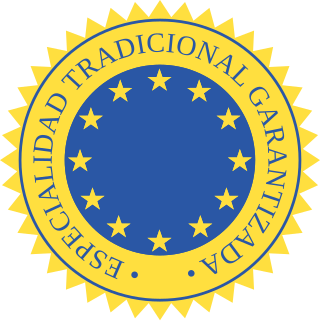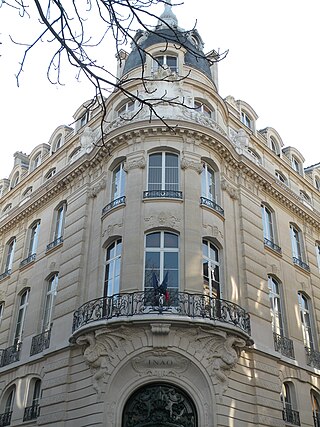Related Research Articles

The World Intellectual Property Organization is one of the 15 specialized agencies of the United Nations (UN). Pursuant to the 1967 Convention Establishing the World Intellectual Property Organization, WIPO was created to promote and protect intellectual property (IP) across the world by cooperating with countries as well as international organizations. It began operations on 26 April 1970 when the convention entered into force. The current Director General is Singaporean Daren Tang, former head of the Intellectual Property Office of Singapore, who began his term on 1 October 2020.

A traditional speciality guaranteed is a traditional food product protected under European Union and/or UK law. This label differs from the geographical indications protected designation of origin (PDO) and protected geographical indication (PGI) in that the TSG label does not certify that the protected food product has a link to a specific geographical area, and thus a product can be produced outside the area or country from which it originates.

Three European Union schemes of geographical indications and traditional specialties, known as protected designation of origin (PDO), protected geographical indication (PGI), and traditional specialities guaranteed (TSG), promote and protect names of agricultural products and foodstuffs. Products registered under one of the three schemes may be marked with the logo for that scheme to help identify those products. The schemes are based on the legal framework provided by the EU Regulation No 1151/2012 of the European Parliament and of the Council of 21 November 2012 on quality schemes for agricultural products and foodstuffs. This regulation applies within the EU as well as in Northern Ireland. Protection of the registered products is gradually expanded internationally via bilateral agreements between the EU and non-EU countries. It ensures that only products genuinely originating in that region are allowed to be identified as such in commerce. The legislation first came into force in 1992. The purpose of the law is to protect the reputation of the regional foods, promote rural and agricultural activity, help producers obtain a premium price for their authentic products, and eliminate the unfair competition and misleading of consumers by non-genuine products, which may be of inferior quality or of different flavour. Critics argue that many of the names, sought for protection by the EU, have become commonplace in trade and should not be protected.

Kampot is a province in southwestern Cambodia. It borders the provinces of Koh Kong and Kampong Speu to the north, Takéo to the east, Kep and the country of Vietnam to the south, and Sihanoukville to the west. To its south it has a coastline of around 45 km on the Gulf of Thailand. It is rich in low arable lands and has abundant natural resources. Its capital is the city of Kampot.

Cambodia is divided into 25 provinces. The capital Phnom Penh is not a province but an "autonomous municipality", equivalent to a province governmentally and administered at the same level as the other 24 provinces.

Emmental, Emmentaler, or Emmenthal is a yellow, medium-hard cheese that originated in the area around Emmental, in the canton of Bern in Switzerland. It is classified as a Swiss-type or Alpine cheese.

Burrata is an Italian cow milk cheese made from mozzarella and cream. The outer casing is solid cheese, while the inside contains stracciatella and cream, giving it an unusual, soft texture. It is typical of Puglia.

In France, the appellation d'origine contrôlée (AOC) is a label that identifies an agricultural product whose stages of production and processing are carried out in a defined geographical area – the terroir – and using recognized and traditional know-how. The specificity of an AOC product is determined by the combination of a physical and biological environment with established production techniques transmitted within a human community that, together, give the product its distinctive qualities. These crucial technical and geographic factors are set forth in standards for each product, including wines, cheeses and meats. Other countries and the European Union have similar labeling systems. The European Union's protected designation of origin system has now harmonized the protection of all geographical indications and their registration. When labelling wine however, producers may still use recognized traditional terms like AOC, and are not required to display the PDO and PGI logos or terms, mostly for aesthetic purposes.

A geographical indication (GI) is a name or sign used on products which corresponds to a specific geographical location or origin. The use of a geographical indication, as an indication of the product's source, is intended as a certification that the product possesses certain qualities, is made according to traditional methods, or enjoys a good reputation due to its geographical origin.

Penja pepper is a type of pepper grown in the volcanic soil of the Penja Valley in Cameroon. It is available as green, white, black and red pepper. Its taste is influenced by the local volcanic soil, which is rich in minerals. Under the name "poivre de Penja", the pepper is protected as a geographical indication in the 17 African OAPI countries under the Bangui agreement, as well as a Protected Geographical Indication in the European Union and Northern Ireland.

The Lisbon Agreement for the Protection of Appellations of Origin and their International Registration, signed on 31 October 1958, ensures that in member countries, appellations of origin receive protection when are protected in their country of origin. It lays down provisions for what qualifies as an appellation of origin, protection measures and establishes an International Register of Appellations of Origin, run by the World Intellectual Property Organization. The agreement came into force in 1966, and was revised at Stockholm (1967) and amended in 1979 and 2015. As of July 2022, 39 states are party to the convention and 1000 appellations of origin has been registered.
The country of Georgia is the first among the EU neighbourhood countries to take an important step towards protecting its local food and beverages from being copied in other countries. The country has a rich history of local and specialist agricultural production and has long been famed for its wines. Names of as many as 18 premium quality local wines have been protected by the use of appellation system, the appellations usually being the geographical name of the area in which the wine is produced.
The Geographical Indications of Goods Act, 1999 is a sui generis Act of the Parliament of India for protection of geographical indications in India. India, as a member of the World Trade Organization (WTO), enacted the Act to comply with the Agreement on Trade-Related Aspects of Intellectual Property Rights. The GI tag ensures that only those registered as authorised users are allowed to use the popular product name. Darjeeling tea became the first GI tagged product in India, in 2004–05, since then 370 goods had been added to the list as of August 2020.

Kampot pepper is a cultivar of black pepper grown and produced in Cambodia. During the early 20th century under the French protectorate within French Indochina it was also known as Indochinese pepper. The pepper's modern name is derived from the area where it is grown, the Province of Kampot, but its historic name uses the French term for Mainland Southeast Asia.
Geographical Indications in Indonesia are a form of intellectual property consisting of an "indication which identifies goods and/or a product as originating from a particular region of which its geographical environment factors including nature, labor, or combination of both factors are attributable to a given reputation, quality, and characteristics of the produced goods and/or product". Geographical indications can be registered based on the Law on Marks and Geographical Indications Foreign geographical indications can only be registered if they are recognised or registered there. As of August 2021, 93 Indications have been registered.
References
- 1 2 3 4 "Law on Geographical Indications" (PDF). government of Cambodia. Retrieved 10 September 2021.
- ↑ "ASEAN GI database". ASEAN . Retrieved 10 September 2021.
- ↑ "Commission Implementing Regulation (EU) 2016/222 of 5 February 2016 entering a name in the register of protected designations of origin and protected geographical indications (ម្រេចកំពត Mrech Kampot)/Poivre de Kampot (PGI))". European Union. Retrieved 10 September 2021.
- ↑ "Commission Implementing Regulation (EU) 2019/542 of 2 April 2019 entering a name in the register of protected designations of origin and protected geographical indications ('ស្ករត្នោតកំពង់ស្ពឺ, Skor Thnot Kampong Speu) (PGI))". European Union. Retrieved 10 September 2021.
- ↑ "Thailand Leads the Way to GI Registration in ASEAN Countries". www.wipo.int. Retrieved 2023-04-12.
- ↑ "(GI 1152) ម្រេចកំពត / KAMPOT PEPPER". WIPO. Retrieved 10 September 2021.